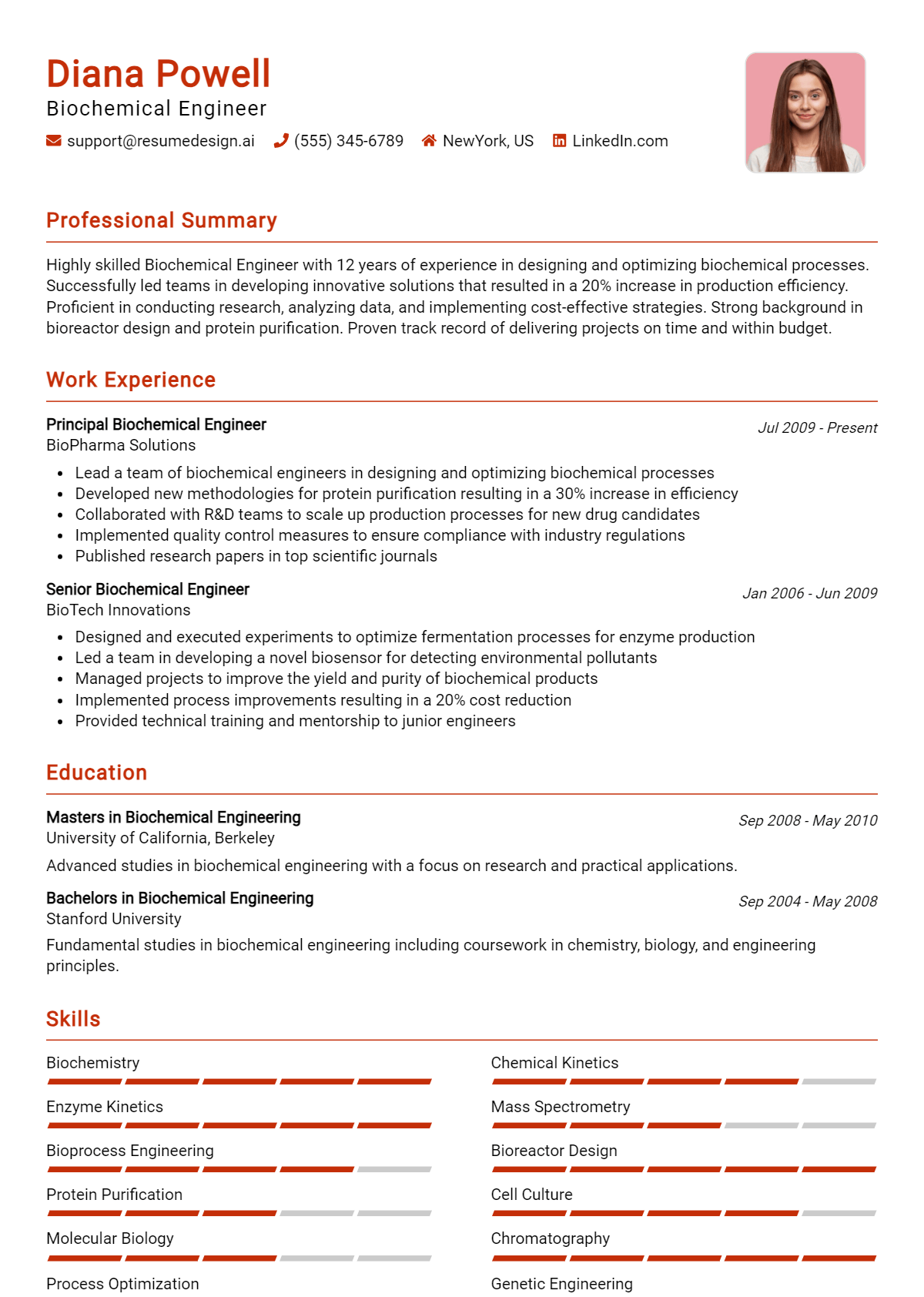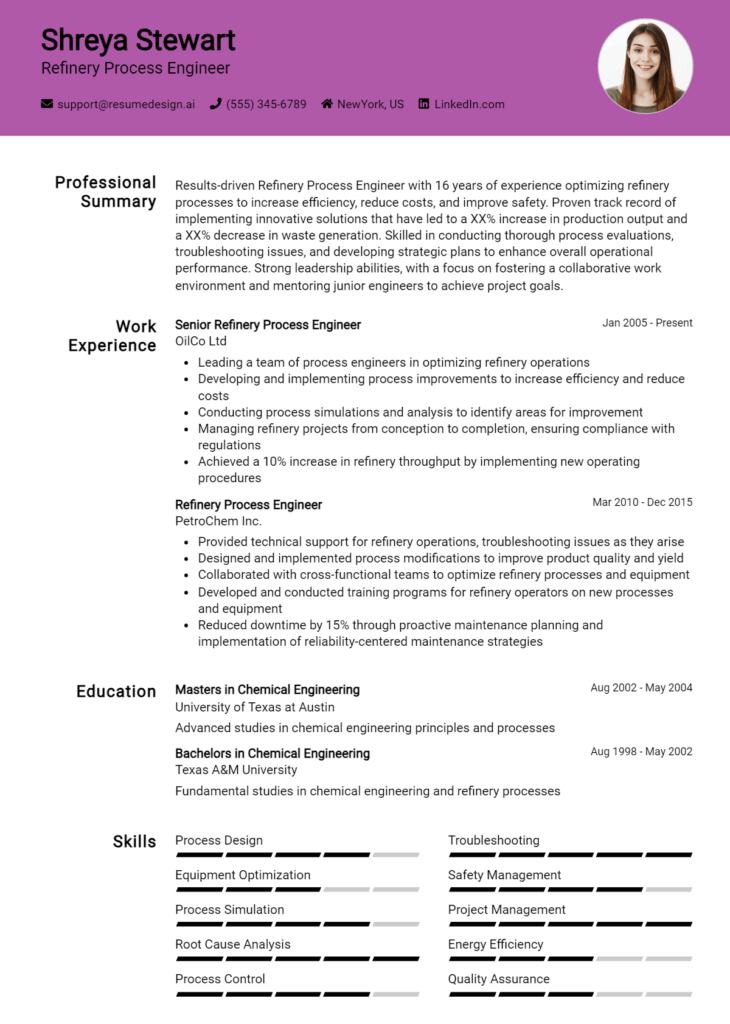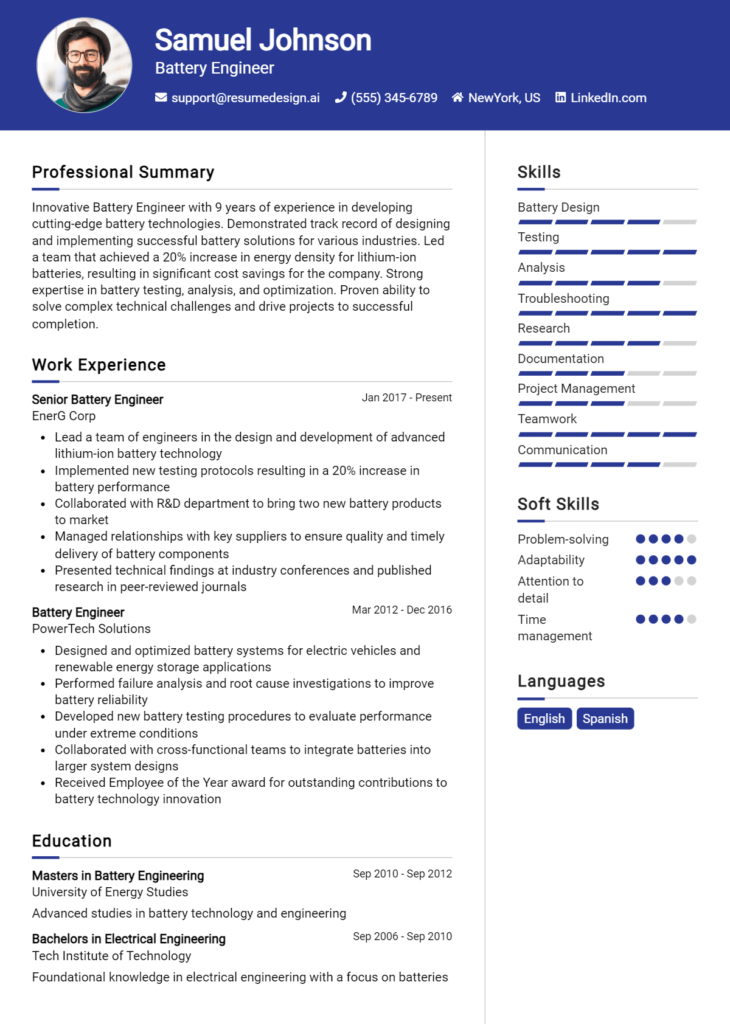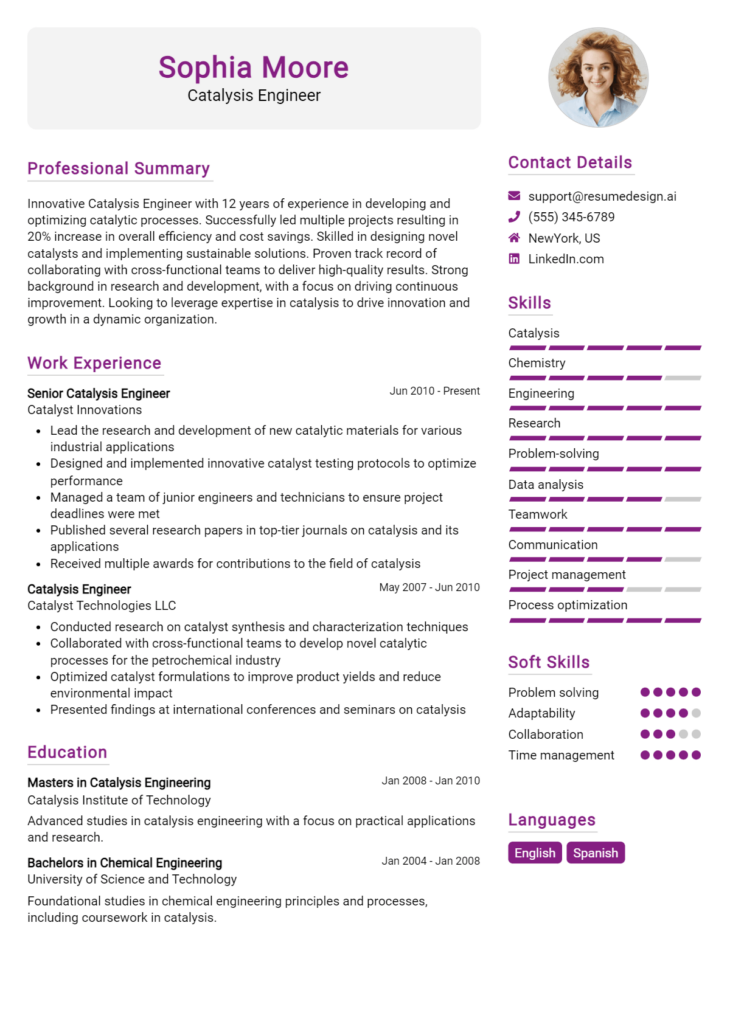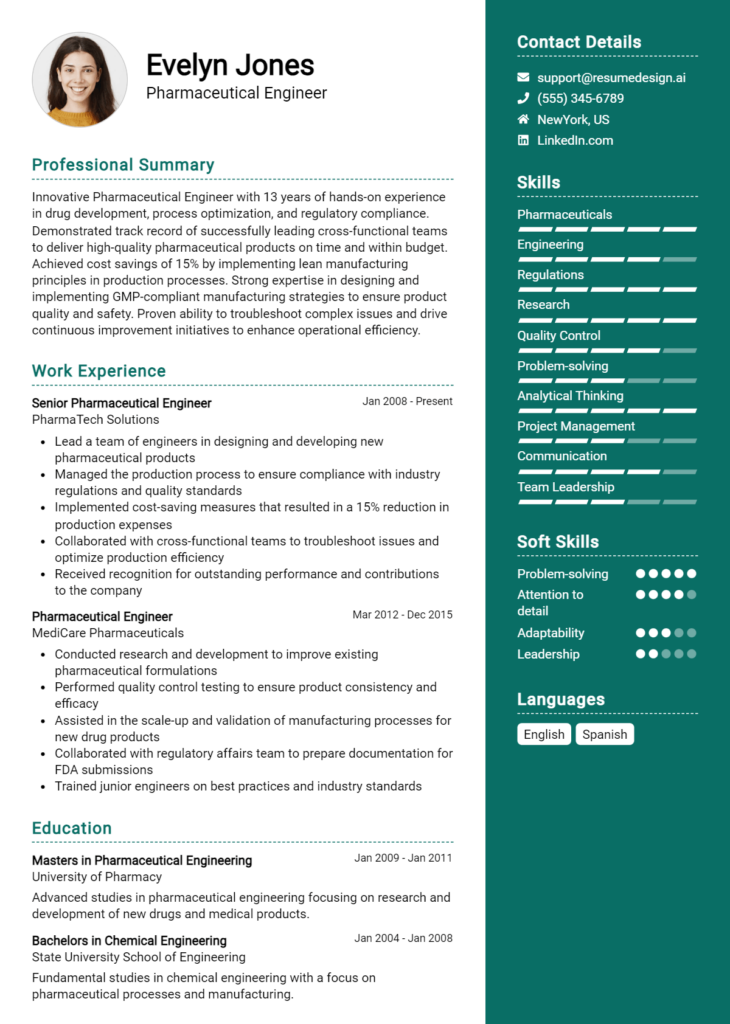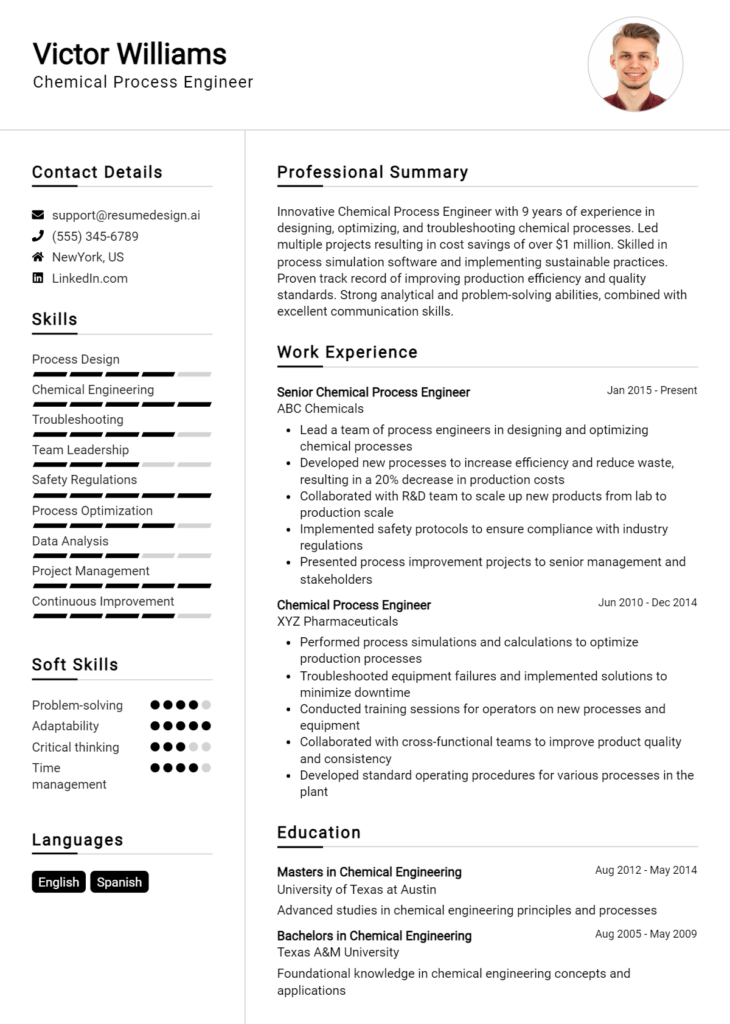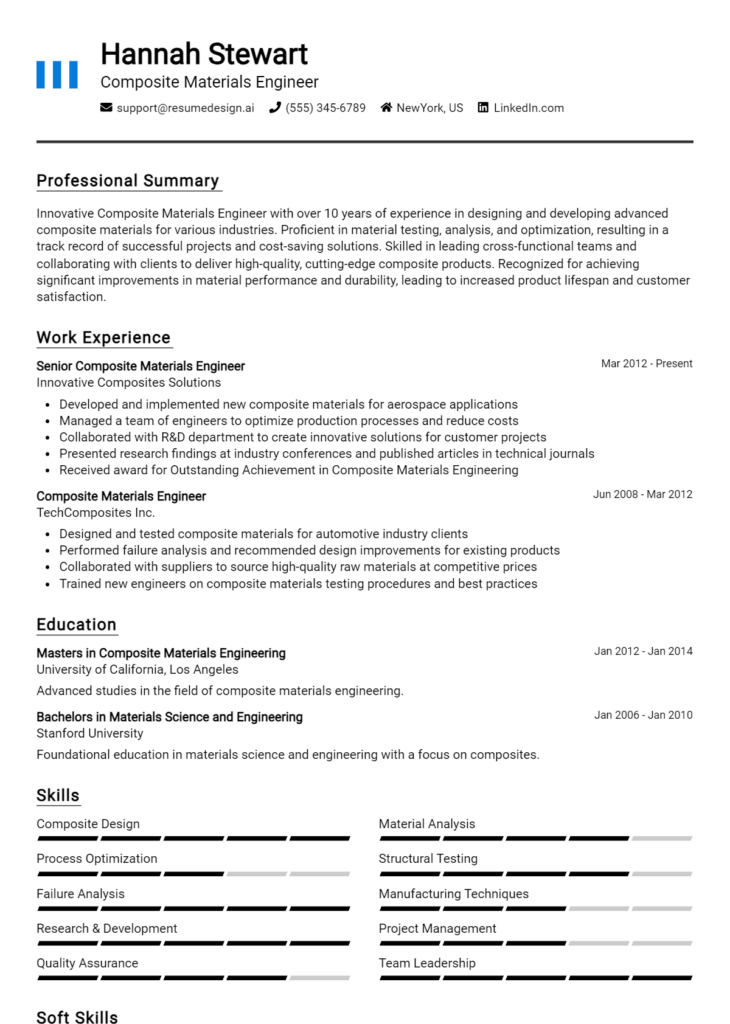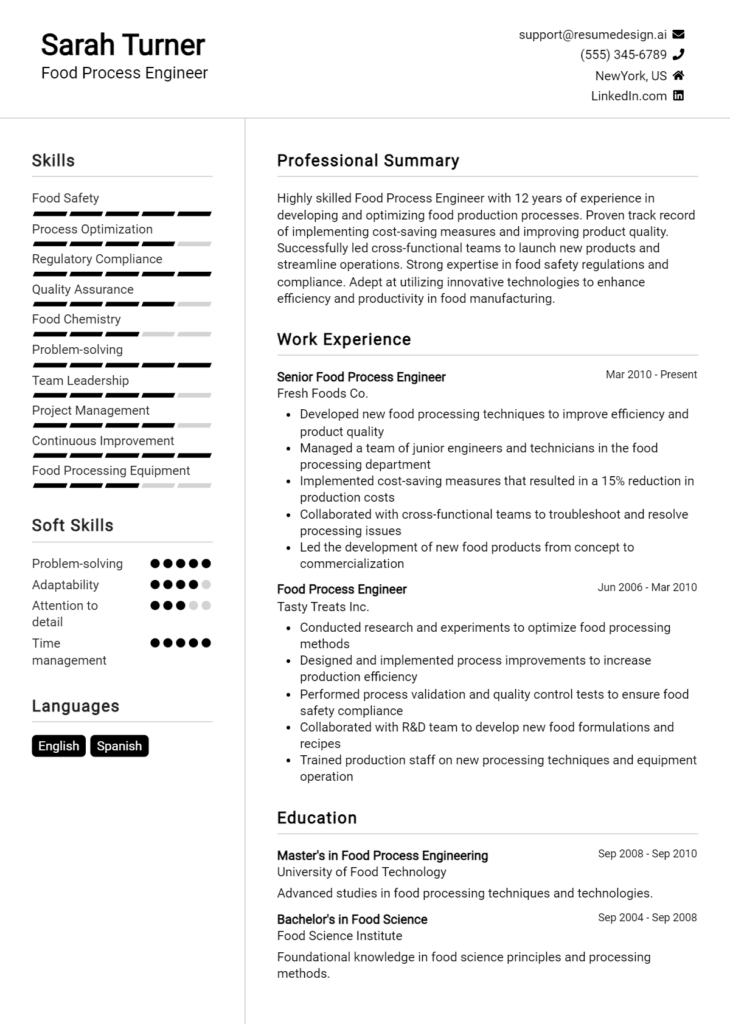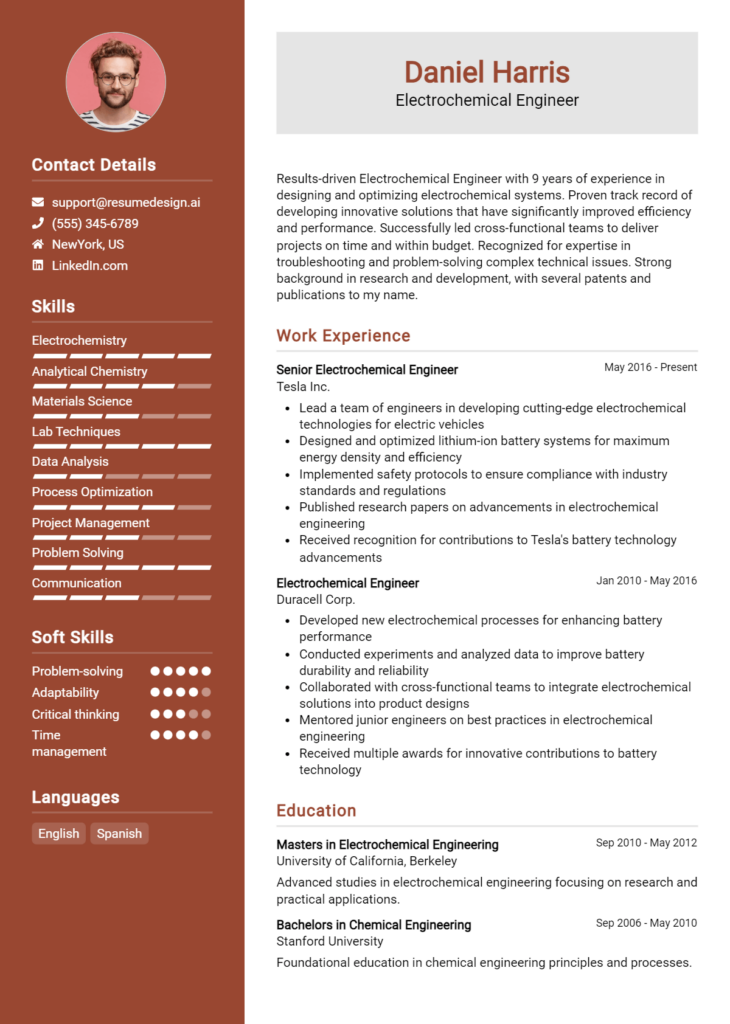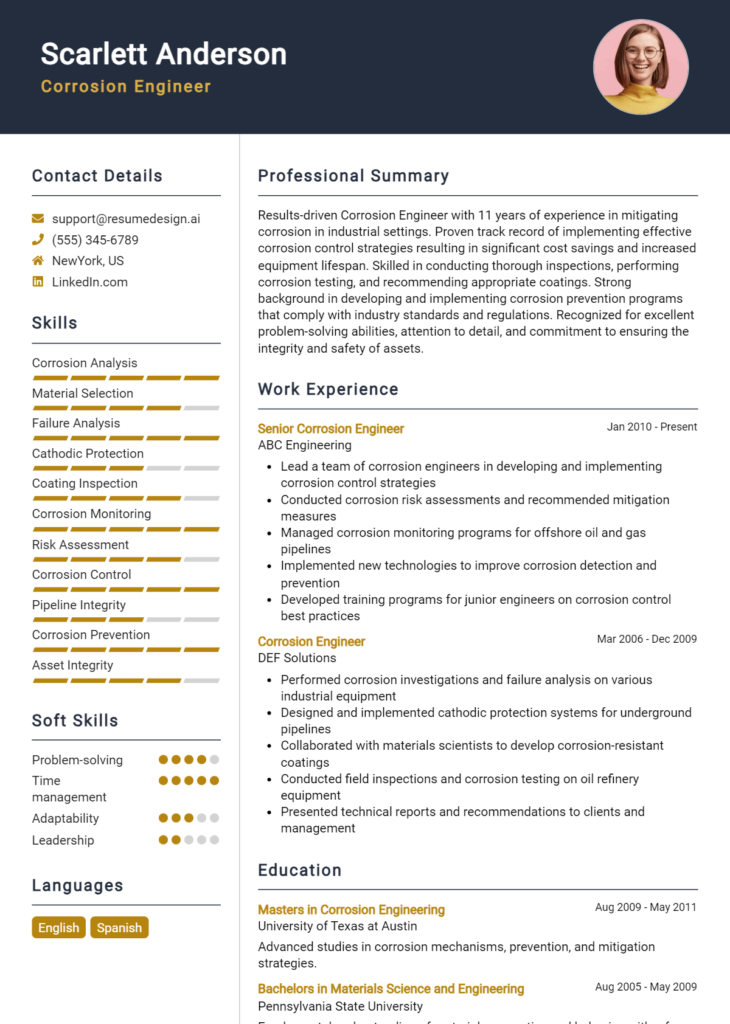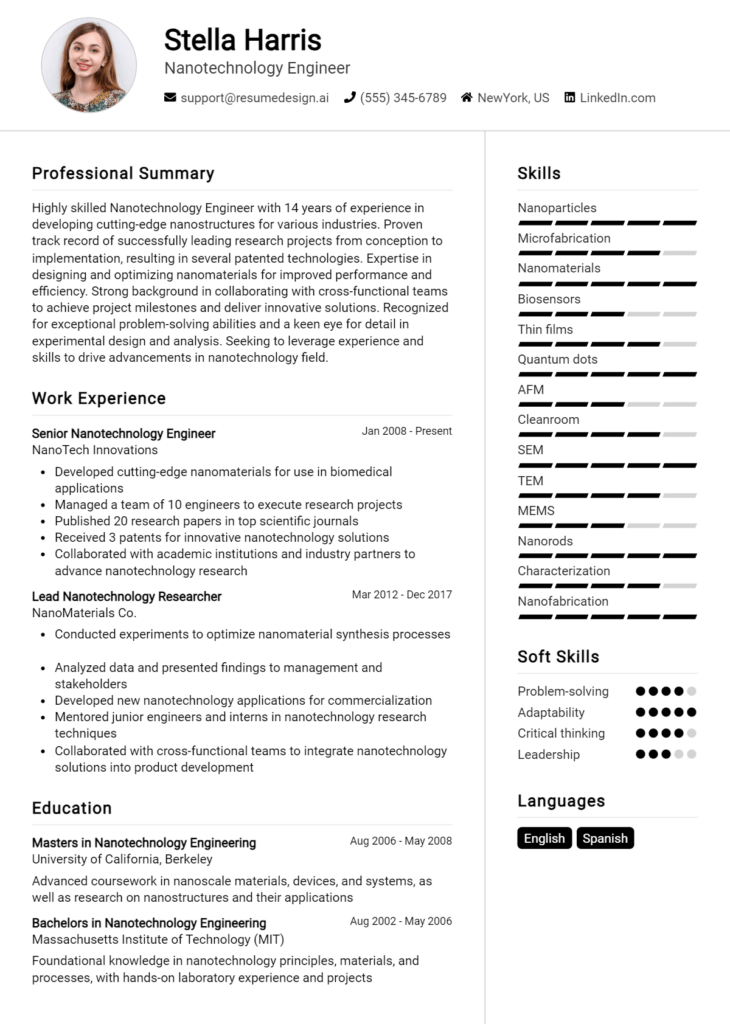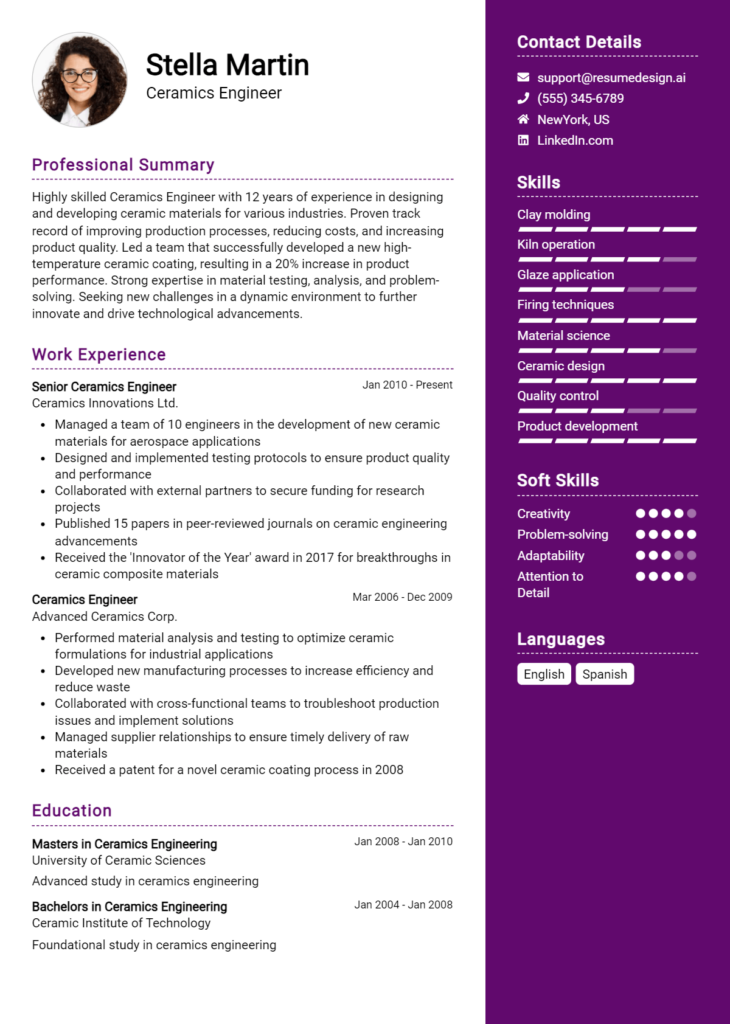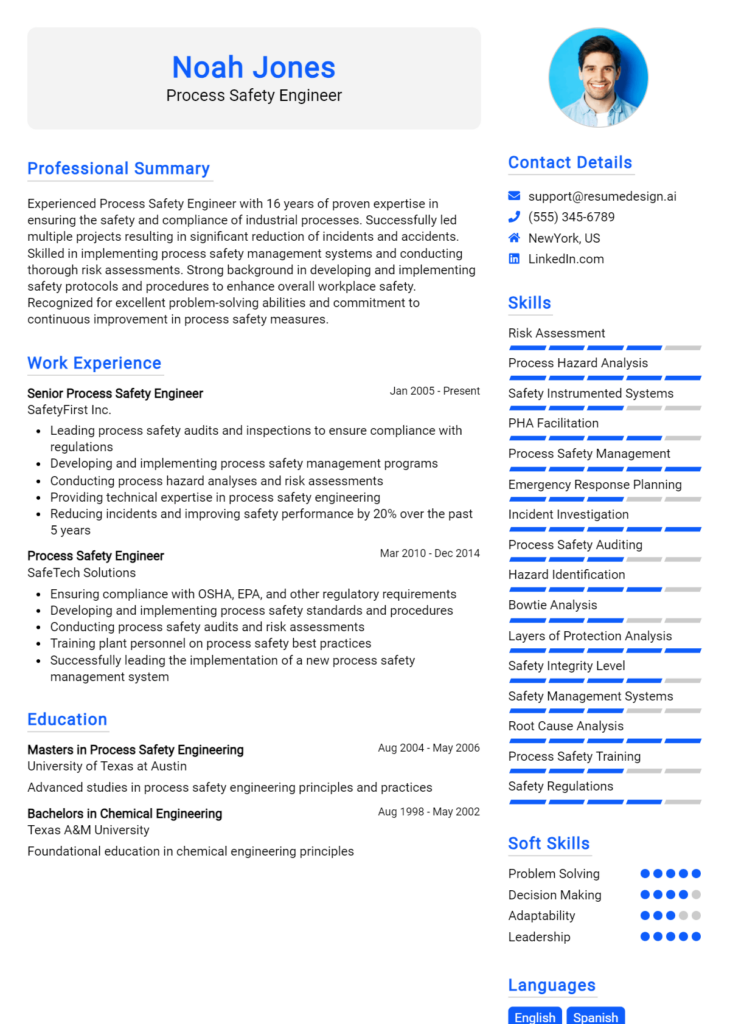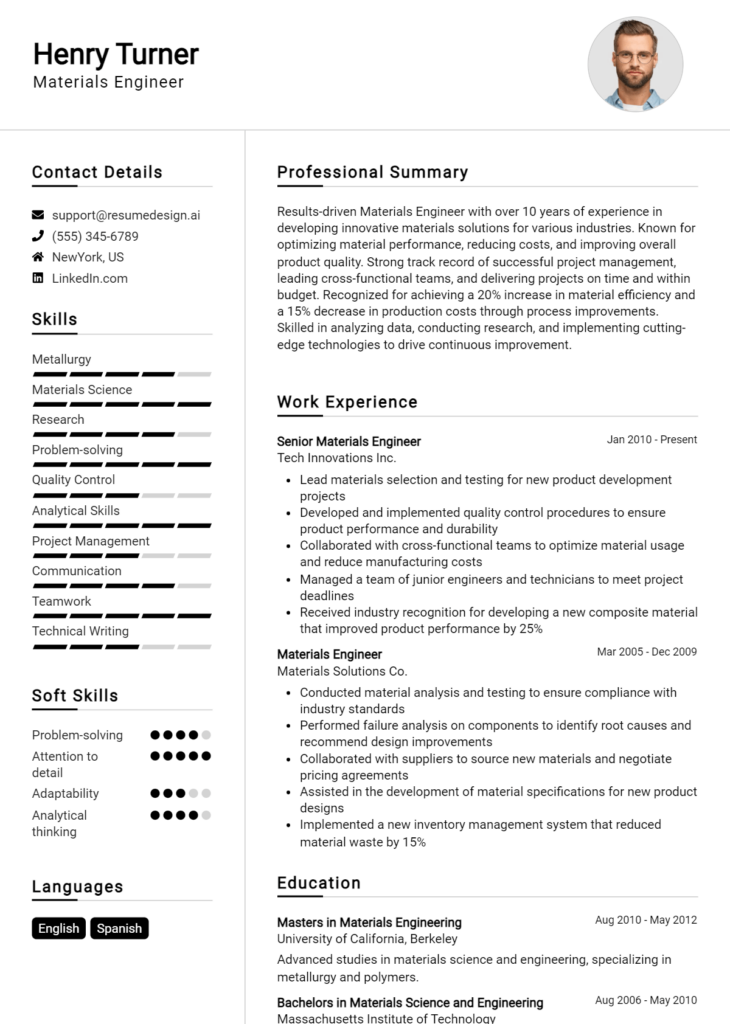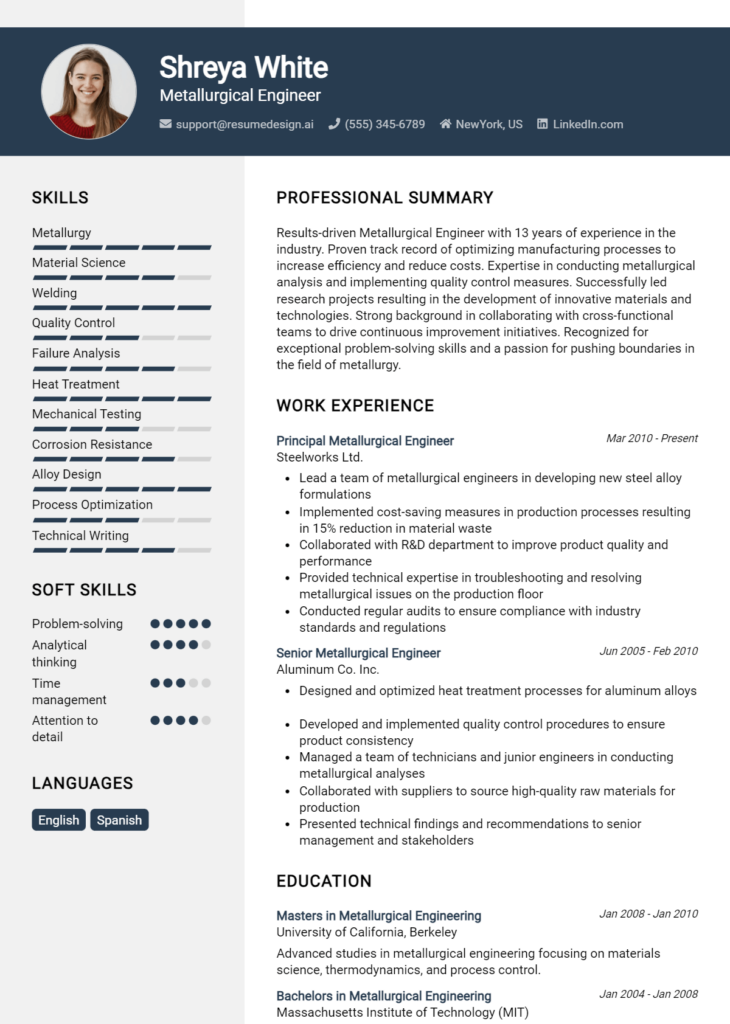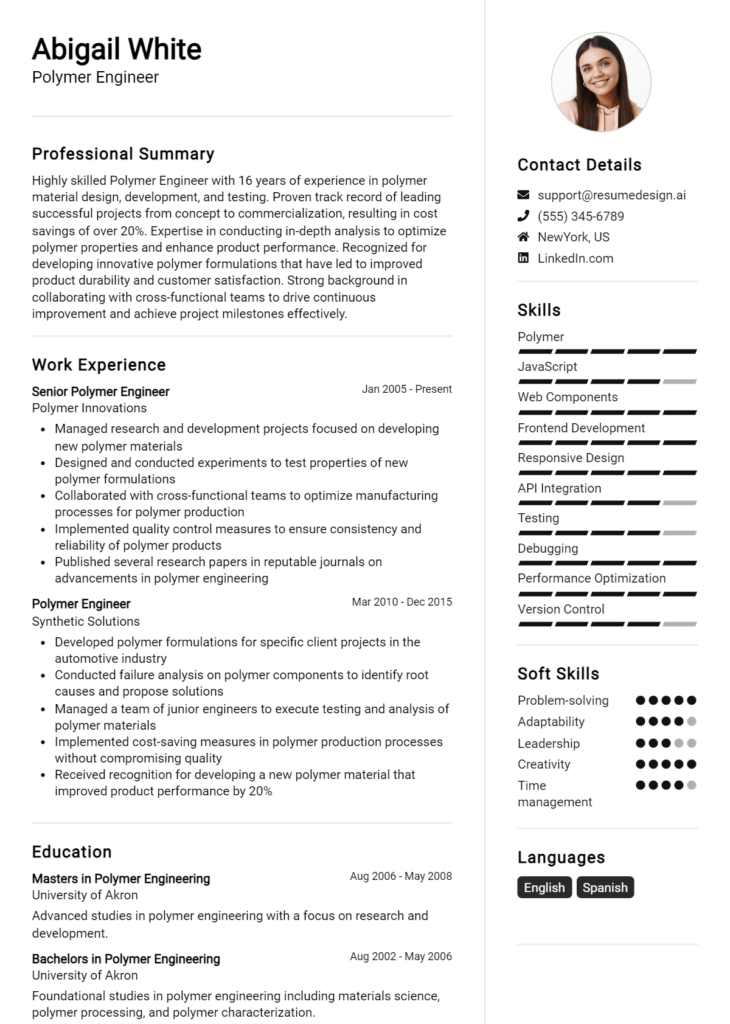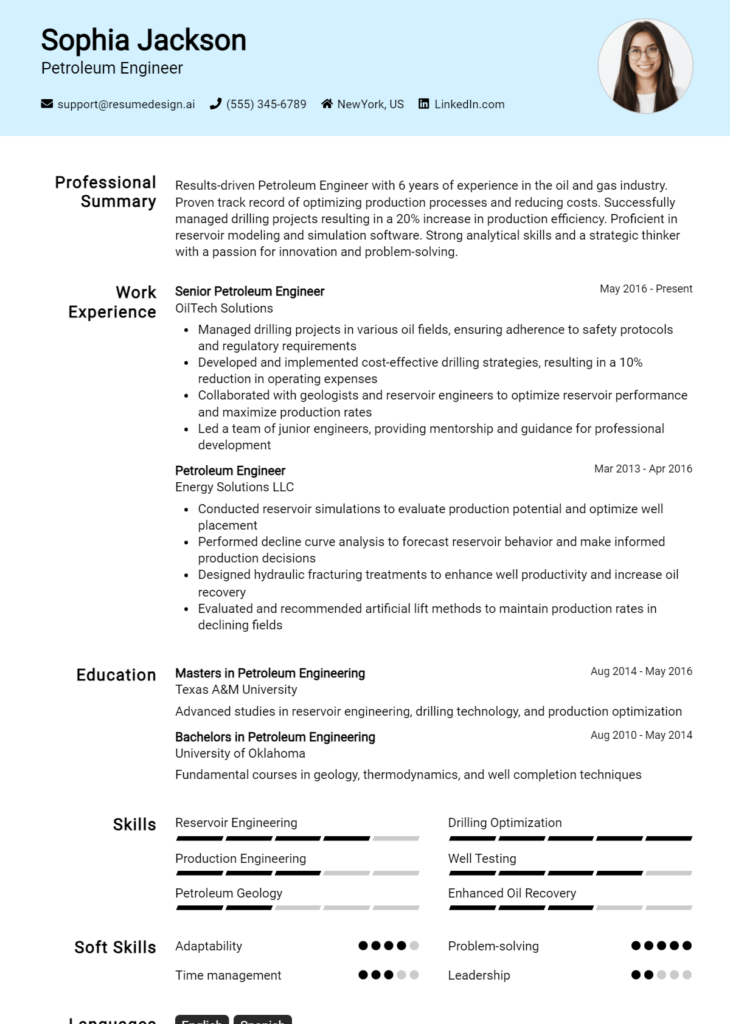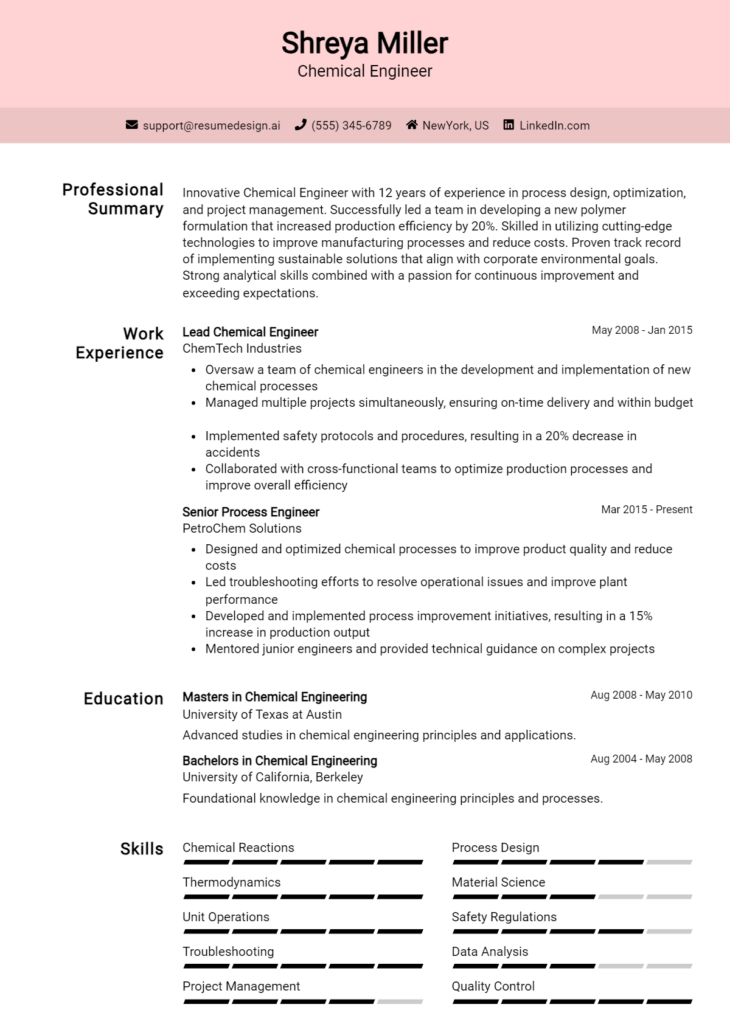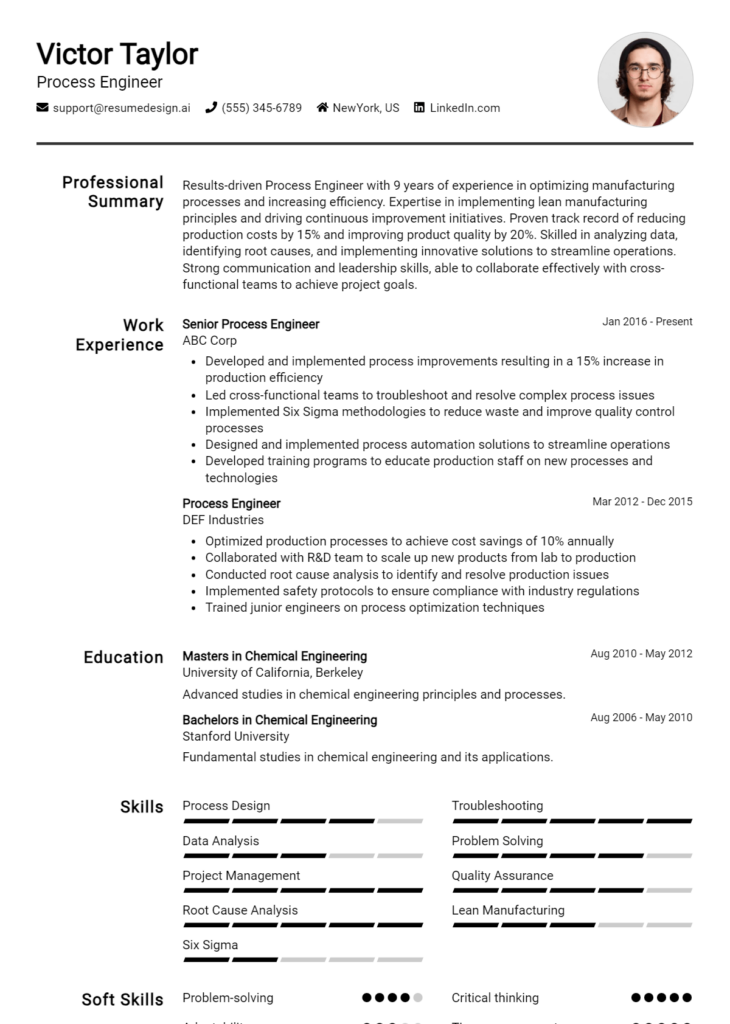Biochemical Engineer Core Responsibilities
A Biochemical Engineer plays a crucial role in developing and optimizing processes that involve biological organisms or molecules, bridging the gap between biology and engineering. Key responsibilities include designing experiments, analyzing data, and collaborating with cross-functional teams in research, production, and quality control. Essential skills encompass strong technical knowledge, operational efficiency, and advanced problem-solving abilities. These competencies significantly contribute to the organization's objectives, and a well-structured resume can effectively highlight these qualifications to potential employers.
Common Responsibilities Listed on Biochemical Engineer Resume
- Design and optimize bioprocessing systems for the production of pharmaceuticals and biochemicals.
- Conduct research and development to improve existing biochemical processes.
- Analyze experimental data and prepare detailed reports on findings.
- Collaborate with multidisciplinary teams to ensure project alignment.
- Implement quality control measures to ensure compliance with regulatory standards.
- Utilize computational modeling for process simulation and optimization.
- Develop and maintain standard operating procedures for laboratory practices.
- Provide technical support and troubleshooting for production issues.
- Stay updated on industry trends and advancements in biotechnology.
- Train and mentor junior engineers and laboratory staff.
- Manage project timelines and budgets effectively.
High-Level Resume Tips for Biochemical Engineer Professionals
In the competitive landscape of biochemical engineering, a well-crafted resume is crucial for making a strong first impression on potential employers. Your resume serves as your personal marketing tool, showcasing not only your technical skills but also your unique achievements and experiences in the field. It is essential to create a document that reflects your expertise and aligns with the expectations of hiring managers in the industry. This guide will provide practical and actionable resume tips specifically tailored for biochemical engineer professionals, helping you to stand out in a crowded job market.
Top Resume Tips for Biochemical Engineer Professionals
- Tailor your resume to the specific job description by highlighting relevant skills and experiences that match the employer's needs.
- Start with a strong summary statement that encapsulates your career goals and key qualifications in biochemical engineering.
- Showcase relevant experience by detailing your roles in previous positions, emphasizing responsibilities and contributions to projects.
- Quantify your achievements using metrics and specific examples, such as improvements in efficiency, cost savings, or successful project completions.
- Highlight industry-specific skills, such as knowledge of bioprocessing, molecular biology techniques, and regulatory compliance.
- Incorporate keywords from the job posting to enhance your resume's visibility in applicant tracking systems (ATS).
- Include relevant certifications and training that can set you apart from other candidates, such as Six Sigma or Good Manufacturing Practices (GMP).
- Ensure your resume is well-organized and visually appealing, using clear headings and bullet points for easy readability.
- Proofread meticulously to eliminate any grammatical errors or typos, as these can detract from your professionalism.
By implementing these tips, you can significantly enhance your resume’s effectiveness, increasing your chances of landing a job in the biochemical engineering field. A polished and targeted resume will not only showcase your qualifications but also demonstrate your commitment to the profession, making you a more attractive candidate to potential employers.
Why Resume Headlines & Titles are Important for Biochemical Engineer
In the competitive field of biochemical engineering, a well-crafted resume headline or title is crucial as it serves as the first impression for hiring managers. A strong headline can quickly capture attention and succinctly summarize a candidate’s key qualifications, making it easier for employers to assess fit for the role. By being concise, relevant, and directly related to the job being applied for, a resume headline can effectively highlight the candidate's unique strengths and expertise, setting the tone for the rest of the resume.
Best Practices for Crafting Resume Headlines for Biochemical Engineer
- Keep it concise—ideally no more than 10 words.
- Use specific job titles or functional keywords relevant to the position.
- Highlight your most significant achievements or skills.
- Tailor the headline to match the job description.
- Incorporate industry-specific jargon to showcase expertise.
- Avoid vague language; be clear and direct.
- Consider including certifications or notable qualifications.
- Use positive and action-oriented language.
Example Resume Headlines for Biochemical Engineer
Strong Resume Headlines
Innovative Biochemical Engineer with 5+ Years in Bioprocess Development
Experienced Biochemical Engineer Specializing in Drug Formulation and Delivery
Results-Driven Biochemical Engineer with Proven Success in Scale-Up Processes
Dynamic Biochemical Engineer Expert in Genetic Engineering Techniques
Weak Resume Headlines
Biochemical Engineer Looking for a Job
Engineer with Experience
Professional in the Field of Biochemistry
The strong headlines are effective because they are specific, highlight key accomplishments, and align with the requirements of potential job openings. They convey a sense of expertise and readiness that can resonate with hiring managers. In contrast, the weak headlines fail to impress because they lack specificity and do not provide any insight into the candidate's qualifications or relevant experience. Such vague titles can easily be overlooked in a sea of applications, ultimately diminishing the candidate's chances of standing out.
Writing an Exceptional Biochemical Engineer Resume Summary
A well-crafted resume summary is crucial for Biochemical Engineers as it serves as the first impression for hiring managers. This brief yet impactful paragraph encapsulates the candidate's key skills, relevant experience, and notable accomplishments, allowing them to stand out in a competitive job market. A strong summary quickly captures attention and piques interest, effectively setting the tone for the rest of the resume. It is essential that this section remains concise, impactful, and tailored to the specific job being applied for, ensuring that the most relevant attributes are highlighted right from the start.
Best Practices for Writing a Biochemical Engineer Resume Summary
- Quantify Achievements: Use specific numbers and metrics to demonstrate your impact, such as project results, efficiency improvements, or cost savings.
- Focus on Relevant Skills: Highlight technical skills and soft skills that are directly applicable to the job description.
- Tailor for Each Job: Customize your summary for the specific position you are applying to by including keywords from the job description.
- Be Concise: Aim for 3-5 sentences that clearly convey your qualifications without being overly verbose.
- Showcase Industry Knowledge: Mention familiarity with industry standards, regulations, or technologies relevant to Biochemical Engineering.
- Emphasize Problem-Solving Abilities: Highlight your capacity to tackle challenges and innovate solutions in biochemical processes.
- Include Professional Experience: Reference significant roles or projects that showcase your expertise and contributions in the field.
- Maintain a Positive Tone: Use action-oriented language that conveys confidence and enthusiasm for the role.
Example Biochemical Engineer Resume Summaries
Strong Resume Summaries
Detail-oriented Biochemical Engineer with over 7 years of experience in optimizing fermentation processes, resulting in a 20% increase in yield and a 15% reduction in production costs. Proficient in bioreactor design and conducting experiments to enhance product quality.
Results-driven professional with a Master's degree in Biochemical Engineering and expertise in enzyme kinetics, successfully developing a novel biocatalyst that improved reaction efficiency by 30%. Proven track record of collaboration with cross-functional teams to drive innovation in product development.
Innovative Biochemical Engineer with 5 years of industry experience, specializing in process scale-up and regulatory compliance. Led a project that reduced waste by 40% through the implementation of a green chemistry approach, significantly enhancing sustainability practices.
Weak Resume Summaries
Biochemical Engineer with experience in the field. I am looking for a job where I can apply my skills.
Motivated engineer with a background in biochemical processes. I want to work in a challenging environment.
The strong resume summaries are considered effective because they provide specific accomplishments, quantified results, and relevant skills that directly relate to the Biochemical Engineering role. They convey a clear message of competence and achievement, making them memorable to hiring managers. In contrast, the weak summaries lack detail, specificity, and quantifiable outcomes, making them generic and less impactful, ultimately failing to capture the attention of potential employers.
Work Experience Section for Biochemical Engineer Resume
The work experience section of a Biochemical Engineer resume is critical for demonstrating the candidate's technical skills, leadership abilities, and commitment to delivering high-quality products. This section not only outlines the individual's practical experiences but also showcases their capacity to manage teams and projects effectively. By quantifying achievements and aligning experiences with industry standards, candidates can provide compelling evidence of their qualifications and readiness for the challenges of the biochemical engineering field.
Best Practices for Biochemical Engineer Work Experience
- Highlight technical skills relevant to biochemical engineering, such as process design or analytical techniques.
- Quantify achievements with metrics, such as percentage improvements in efficiency or cost reductions.
- Demonstrate leadership experience by detailing team management and project oversight roles.
- Include collaboration examples that showcase teamwork across multidisciplinary teams.
- Focus on results-oriented experiences that align with industry standards and expectations.
- Tailor job descriptions to reflect the specific responsibilities and technologies used in biochemical engineering.
- Use action verbs to convey proactivity and impact in previous roles.
- Keep descriptions concise while ensuring clarity and relevance to the job applied for.
Example Work Experiences for Biochemical Engineer
Strong Experiences
- Led a cross-functional team to develop a novel bioprocess that increased product yield by 30%, resulting in a $500,000 annual revenue increase.
- Implemented an automated quality control system that reduced testing time by 40%, ensuring faster time-to-market for new products.
- Managed a team of five engineers in the redesign of a fermentation process, successfully decreasing production costs by 20% while maintaining product quality.
- Collaborated with R&D to develop a biocompatible material, leading to a successful patent application and partnership with a major biomedical company.
Weak Experiences
- Worked on various projects related to biochemical engineering.
- Helped with team meetings and contributed to discussions.
- Involved in some process improvements.
- Assisted in projects without clear outcomes or metrics.
The experiences labeled as strong provide specific examples of achievements and measurable outcomes, showcasing the candidate's technical leadership and collaborative skills. In contrast, the weak experiences lack detail, metrics, and clear contributions, making them less impactful and not effectively demonstrating the candidate's capabilities in the competitive field of biochemical engineering.
Education and Certifications Section for Biochemical Engineer Resume
The education and certifications section of a Biochemical Engineer resume is crucial as it showcases the candidate's academic qualifications and demonstrates their commitment to professional development. This section highlights not only the degrees earned but also relevant industry certifications and specialized training that can set a candidate apart in a competitive job market. By providing details about relevant coursework and continuous learning efforts, candidates can enhance their credibility and show alignment with the specific requirements of the job role, ultimately increasing their chances of securing an interview.
Best Practices for Biochemical Engineer Education and Certifications
- Include your most recent and relevant degrees first, emphasizing those related to biochemical engineering.
- List industry-recognized certifications that demonstrate your expertise and commitment to the field.
- Provide details on relevant coursework that showcases specialized knowledge applicable to the job.
- Be specific about the institution and location where you obtained your education and certifications.
- Highlight any additional training or workshops that are pertinent to biochemical engineering.
- Keep the section concise but detailed enough to convey your qualifications effectively.
- Consider including honors, awards, or recognitions that pertain to your academic or professional achievements.
- Ensure the formatting is consistent and easy to read for a professional appearance.
Example Education and Certifications for Biochemical Engineer
Strong Examples
- M.S. in Biochemical Engineering, University of California, Berkeley, 2022
- Certified Biochemical Engineer (CBE), American Institute of Chemical Engineers, 2023
- Relevant Coursework: Metabolic Engineering, Bioprocess Design, and Biomolecular Engineering
- Professional Development: Advanced Bioprocessing Techniques Workshop, 2021
Weak Examples
- B.A. in English Literature, University of Michigan, 2010
- Certification in Microsoft Office Suite, 2019
- Relevant Coursework: Introduction to Sociology, 2015
- High School Diploma, Anytown High School, 2008
The strong examples are considered effective because they directly relate to the field of biochemical engineering, showcasing relevant degrees, certifications, and specialized coursework that align with the requirements of the job role. In contrast, the weak examples lack relevance to the biochemical engineering discipline, featuring outdated qualifications and certifications that do not demonstrate a commitment to the industry, ultimately diminishing the candidate's credibility.
Top Skills & Keywords for Biochemical Engineer Resume
In the competitive field of biochemical engineering, showcasing the right skills on your resume is crucial for standing out to potential employers. A well-crafted resume not only highlights your technical expertise but also showcases your ability to collaborate, innovate, and solve complex problems—qualities that are essential in this multidisciplinary field. By effectively presenting both your hard and soft skills, you can demonstrate that you are not only proficient in biochemical engineering principles but also capable of thriving in dynamic team environments. This balance of skills is vital for advancing your career and making meaningful contributions to projects that impact health and sustainability.
Top Hard & Soft Skills for Biochemical Engineer
Soft Skills
- Problem-solving
- Critical thinking
- Communication
- Team collaboration
- Time management
- Adaptability
- Attention to detail
- Project management
- Creativity
- Leadership
Hard Skills
- Bioprocessing techniques
- Genetic engineering
- Bioinformatics
- Analytical chemistry
- Laboratory techniques (e.g., chromatography, spectroscopy)
- Quality control and assurance
- Regulatory compliance (FDA, EPA)
- Data analysis and statistical software (e.g., MATLAB, R)
- Process optimization
- Instrumentation and equipment maintenance
For more insights on enhancing your resume, consider exploring these skills and work experience sections.
Stand Out with a Winning Biochemical Engineer Cover Letter
I am writing to express my interest in the Biochemical Engineer position at [Company Name], as advertised on [Job Posting Source]. With a Bachelor’s degree in Biochemical Engineering from [Your University] and over [X years] of experience in the biotechnology sector, I have developed a robust skill set that aligns well with the requirements of this role. My background in biochemical processes, combined with my expertise in process optimization and scale-up, positions me to make a significant contribution to your team.
In my previous role at [Previous Company Name], I successfully led a team in the design and implementation of a bioreactor system that increased product yield by over 30%. I applied my knowledge of biochemical pathways and metabolic engineering to enhance the efficiency of the fermentation process. Through rigorous data analysis and the application of statistical tools, I was able to identify bottlenecks and optimize conditions, ensuring that our production met both quality and regulatory standards. My collaborative approach and strong communication skills enabled me to work effectively with cross-functional teams, including R&D, quality assurance, and regulatory affairs.
I am particularly drawn to the innovative projects at [Company Name], especially your commitment to sustainable practices and cutting-edge research in [specific area of interest related to the company]. I am eager to bring my experience in developing green bioprocesses and my passion for advancing biotechnological solutions to your organization. I am confident that my proactive mindset and problem-solving abilities will allow me to contribute to your ongoing success and drive new initiatives.
Thank you for considering my application. I look forward to the opportunity to discuss how my background, skills, and enthusiasms align with the goals of [Company Name]. I am excited about the possibility of being part of a team that is at the forefront of biotechnological advancements and am eager to contribute to projects that make a meaningful impact on health and the environment.
Common Mistakes to Avoid in a Biochemical Engineer Resume
When crafting a resume as a Biochemical Engineer, it's crucial to present your qualifications and experiences in the best possible light. However, many candidates make common mistakes that can undermine their chances of landing an interview. Avoiding these pitfalls can help ensure that your resume effectively communicates your skills and suitability for the role. Here are some common mistakes to watch out for:
Overly Technical Language: Using excessive jargon or complex terminology can alienate hiring managers. Aim for clarity and ensure your resume can be understood by those outside of your specific field.
Neglecting Key Skills: Failing to highlight relevant skills, such as proficiency in specific software or techniques related to biochemical engineering, can make you seem less qualified. Tailor your skills section to match the job description.
Using a Generic Template: Relying on a one-size-fits-all resume template can lead to a lack of personalization. Customize your resume for each application to reflect the unique requirements of the position.
Listing Duties Instead of Achievements: Simply outlining job responsibilities without emphasizing accomplishments can make your experience appear less impactful. Focus on what you achieved in each role, quantifying results where possible.
Ignoring Formatting Consistency: Inconsistent formatting, such as varying font sizes or styles, can distract from your content. Maintain uniformity in font, size, and bullet points for a polished look.
Not Including Relevant Projects: Omitting important projects, research, or internships can weaken your resume. Include relevant academic or professional projects that showcase your engineering capabilities and problem-solving skills.
Failing to Tailor for ATS: Many companies use Applicant Tracking Systems (ATS) to filter resumes. Not including relevant keywords from the job description can result in your resume being overlooked. Ensure your resume aligns with the job requirements for better visibility.
Skipping the Cover Letter: Neglecting to include a cover letter can be a missed opportunity to expand on your resume. A well-crafted cover letter can provide context and demonstrate your enthusiasm for the position.
Conclusion
As a Biochemical Engineer, you play a crucial role in the intersection of biology and engineering, applying your expertise to develop innovative solutions in healthcare, pharmaceuticals, and environmental sustainability. Throughout this article, we explored the key responsibilities of a Biochemical Engineer, including designing and optimizing bioprocesses, conducting research to enhance product yield, and ensuring compliance with safety and regulatory standards. We also highlighted the importance of strong analytical skills, teamwork, and communication in effectively collaborating with multidisciplinary teams and stakeholders.
In conclusion, as you navigate your career in this dynamic field, it's essential to have a polished and professional resume that showcases your unique skills and experiences. Take the time to review and update your Biochemical Engineer resume to ensure it reflects your qualifications and achievements accurately.
To assist you in this process, consider utilizing the following resources:
- Resume templates to create a visually appealing layout.
- Resume builder for an easy and guided approach to crafting your document.
- Resume examples for inspiration and guidance on effective content.
- Cover letter templates to complement your resume and make a strong impression.
Don't miss the opportunity to stand out in the competitive job market. Start refining your resume today!

